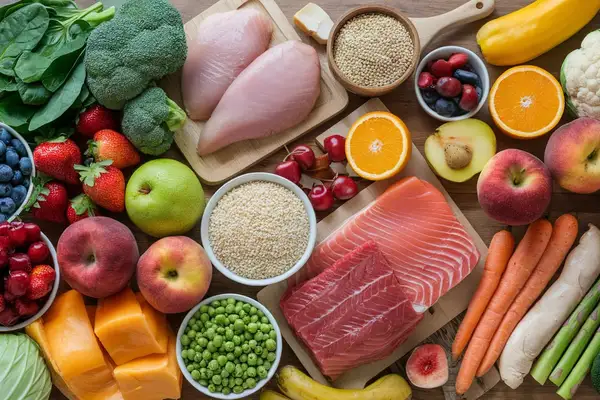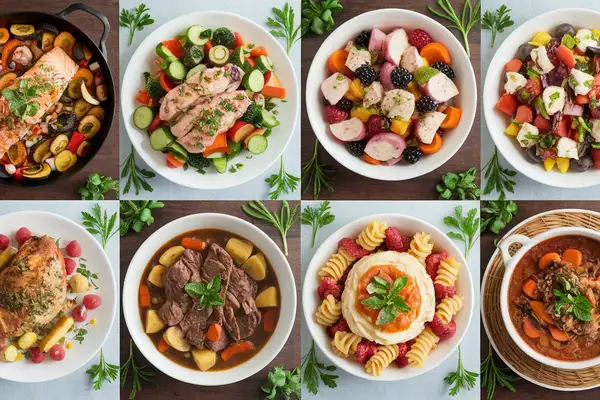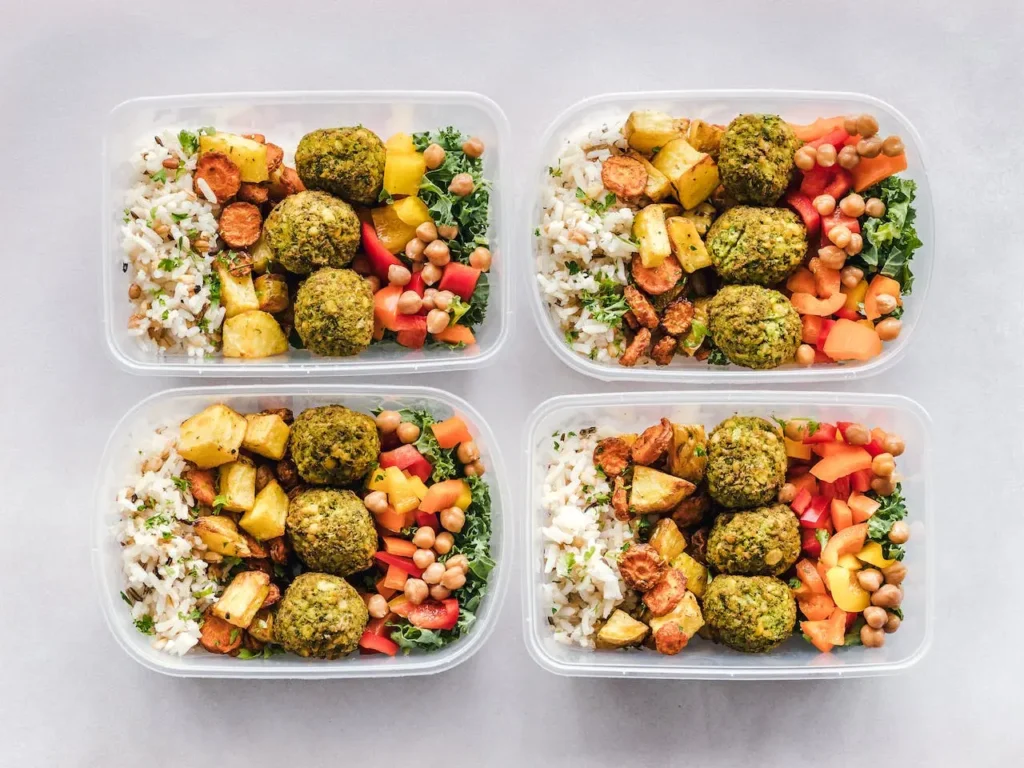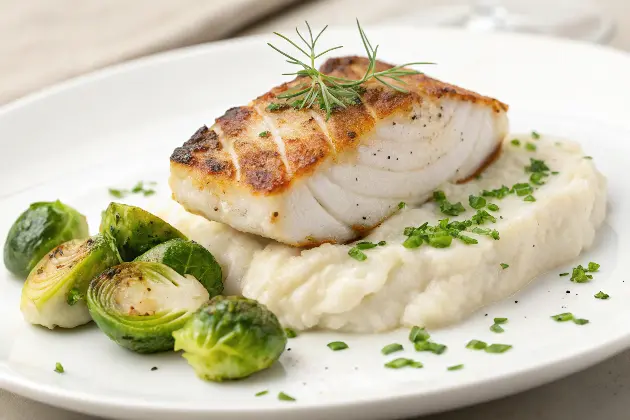Free 16:8 Beginner Intermittent Fasting Meal Plan
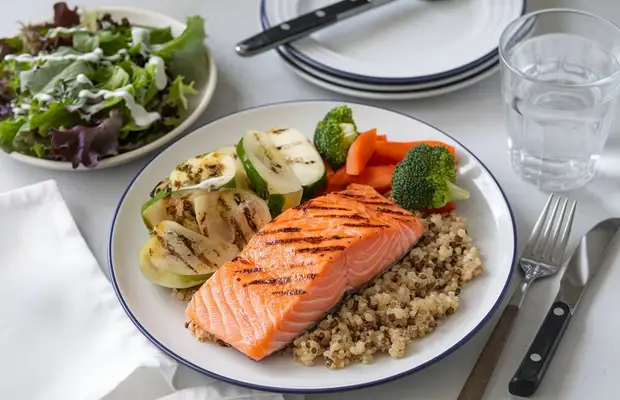
This post may contain affiliate links, meaning I may earn a commission if you make a purchase, at no extra cost to you. I only recommend products I trust. Thank you for your support.
If you’re new to intermittent fasting and looking to kickstart your journey to better health, having a structured meal plan can be incredibly helpful.
Intermittent fasting involves cycling between periods of eating and fasting, and for beginners, it’s important to ease into this eating pattern with a well-balanced meal plan.
It has gained popularity in recent years due to its potential health benefits and effectiveness for weight loss. The concept of intermittent fasting is not about what you eat, but rather when you eat.
There are several different methods of intermittent fasting, but they all involve splitting the day or week into periods of fasting and eating.
During the fasting periods, you abstain from consuming any calories, while during the eating periods, you can consume your meals as usual.
This beginner intermittent fasting meal plan will guide you through the process, helping you make healthy food choices and establish a sustainable eating routine.
What is Intermittent Fasting?
Intermittent fasting (IF) is an eating pattern that cycles between periods of eating and fasting. It doesn’t focus on specific foods to eat but rather on when to eat them.
People practice intermittent fasting for health benefits such as weight loss, improved metabolism, and enhanced cellular repair.
There are several popular methods of intermittent fasting:
- 16/8 Method: Fast for 16 hours and eat during an 8-hour window each day (e.g., eating from 12 PM to 8 PM).
- 18/6 Method: A more extended fasting period, where you fast for 18 hours and eat within a 6-hour window (e.g., eating from 12 PM to 6 PM). This offers a slightly more intense fast than the 16/8 method and may accelerate certain health benefits.
- 5:2 Diet: Eat normally for five days a week, then restrict calories (500–600) on the other two days.
- OMAD (One Meal a Day): This method involves fasting for 23 hours and consuming all of your daily calories within a one-hour window. You essentially eat just one large meal per day.
- Eat-Stop-Eat: Fast for a full 24 hours once or twice a week, such as from dinner one day to dinner the next.
- Alternate Day Fasting: Fast every other day, eating normally on non-fasting days.
- Warrior Diet: Fast for 20 hours and eat one large meal during a 4-hour eating window, typically at night.
Foods to Eat While Intermittent Fasting (16:8 Method)
While intermittent fasting, especially with the 16:8 method, there are no strict restrictions on what to eat during the eating window, but choosing the right foods can significantly enhance the benefits of fasting.
Here’s a general guide on foods to eat during intermittent fasting:
High-Protein Foods:
Protein helps keep you full longer and supports muscle maintenance.
- Lean meats (chicken, turkey)
- Fish (salmon, tuna)
- Eggs
- Greek yogurt
- Plant-based proteins (tofu, lentils, chickpeas)
Healthy Fats:
Fats provide long-lasting energy and help you stay satiated.
- Avocados
- Olive oil
- Nuts and seeds (almonds, chia seeds, flaxseeds)
- Fatty fish (salmon, mackerel)
Complex Carbohydrates:
These are slowly digested and provide steady energy.
- Whole grains (brown rice, quinoa, oats)
- Sweet potatoes
- Legumes (beans, lentils)
- Vegetables like broccoli, spinach, and carrots
Fibrous Vegetables and Fruits:
These promote digestion and keep you feeling full.
- Leafy greens (spinach, kale)
- Cruciferous vegetables (broccoli, cauliflower)
- Berries (strawberries, blueberries, raspberries)
- Apples and pears (with skin)
Hydrating Beverages:
Hydration is key during the fasting period and helps curb hunger.
- Water (plain or infused with lemon or cucumber)
- Herbal teas (peppermint, chamomile)
- Black coffee (unsweetened)
Foods to Avoid While Intermittent Fasting
Even though there are no restrictions on what to eat during intermittent fasting, it’s important to avoid certain foods as they can hinder your progress and reduce the effectiveness of your fasting routine.
Here are some of the foods to avoid during intermittent fasting:
Sugary Foods and Drinks:
These can spike insulin and leave you feeling hungry quickly.
- Sugary sodas, fruit juices
- Candy, pastries, cakes
- Sugary cereals
Refined Carbohydrates:
These are digested quickly, causing energy crashes and hunger soon after eating.
- White bread, pasta, and rice
- Processed snacks (crackers, chips)
- Baked goods (donuts, muffins)
Highly Processed Foods:
These tend to be low in nutrients and high in unhealthy fats and sugars.
- Fast food (burgers, fries)
- Pre-packaged frozen meals
- Processed meats (bacon, sausages)
Excessive Caffeine:
While black coffee is okay, too much caffeine can lead to dehydration and disrupt sleep.
- Avoid energy drinks and limit coffee intake.
Alcohol:
It can interfere with fat metabolism and disrupt sleep, hindering the benefits of fasting.
- Beer
- Wine
- Cocktails
- Spirits
7-Day 16/8 Beginner Intermittent Fasting Meal Plan
This beginner intermittent fasting meal plan follows the 16:8 method, featuring two main meals and a snack, within an 8-hour eating window from 12 PM to 8 PM.
This approach aims to provide balanced nutrition and maintain steady energy levels while adhering to the fasting protocol.
Choosing the right eating window can make intermittent fasting more manageable and a better fit for your daily routine.
This 16/8 intermittent fasting meal plan focuses on nutrient-dense foods that promote overall health, with balanced meals that provide a mix of protein, healthy fats, and wholesome carbohydrates.

Day 1
Breakfast (12:00 PM – Eating Window Opens)
- Avocado Toast with Eggs: Whole grain toast topped with mashed avocado and a poached egg for a balance of healthy fats and protein. (1 slice whole grain bread, ½ avocado, 1 poached egg)
Snack (4:00 PM)
- Almonds: A small portion of almonds for a satisfying and nutritious snack. (1 oz almonds)
Dinner (8:00 PM – Eating Window Closes)
- Grilled Chicken Salad: A nutrient-dense salad made with mixed greens, grilled chicken breast, avocado, and olive oil vinaigrette, providing lean protein and healthy fats. (6 oz grilled chicken, 2 cups mixed greens, ½ avocado, 1 tbsp olive oil)
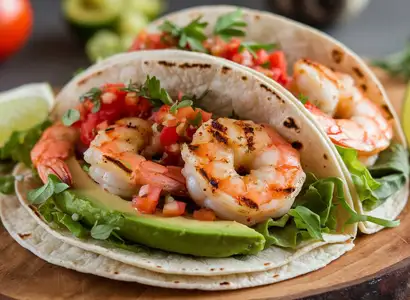
Day 2
Breakfast (12:00 PM – Eating Window Opens)
- Oatmeal with Almond Butter and Berries: Oats topped with almond butter and fresh berries for fiber and healthy fats. (½ cup oats, 1 tbsp almond butter, ½ cup mixed berries)
Snack (4:00 PM)
- Blueberries: Fresh blueberries for a nutrient-packed snack. (½ cup blueberries)
Dinner (8:00 PM – Eating Window Closes)
- Grilled Shrimp Tacos: Whole wheat tortillas filled with grilled shrimp, avocado, and salsa. (6 oz shrimp, 2 whole wheat tortillas, ½ avocado, salsa)
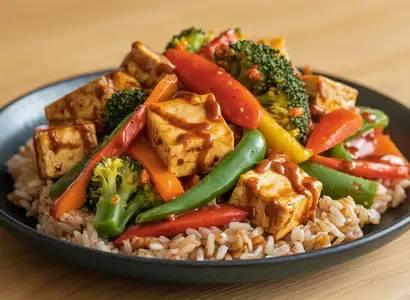
Day 3
Breakfast (12:00 PM – Eating Window Opens)
- Chia Pudding with Almond Milk: Chia seeds soaked in almond milk overnight, topped with berries. (¼ cup chia seeds, 1 cup almond milk, ½ cup mixed berries)
Snack (4:00 PM)
- Grapes: A refreshing snack of grapes to add some natural sweetness. (1 cup grapes)
Dinner (8:00 PM – Eating Window Closes)
- Teriyaki Tofu Stir-Fry: Tofu with mixed veggies in teriyaki sauce, served over brown rice. (1 cup tofu, 1 cup mixed veggies, ½ cup brown rice, 2 tbsp teriyaki sauce)

Day 4
Breakfast (12:00 PM – Eating Window Opens)
- Scrambled Eggs with Spinach: Scrambled eggs with sautéed spinach for protein and vitamins. (2 eggs, 1 cup spinach, 1 tsp olive oil)
Snack (4:00 PM)
- Raspberries: Tangy raspberries satisfy your sweet tooth and provide antioxidants. (½ cup raspberries)
Dinner (8:00 PM – Eating Window Closes)
- Grilled Chicken Thighs with Mixed Vegetables: Juicy grilled chicken thighs served with a variety of roasted mixed vegetables. (6 oz chicken thighs, 1 cup mixed vegetables)
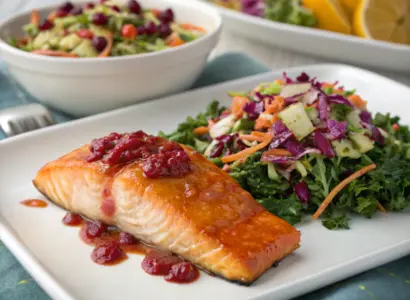
Day 5
Breakfast (12:00 PM – Eating Window Opens)
- Smoothie with Banana and Peanut Butter: A smoothie made with almond milk, banana, and peanut butter. (1 banana, 1 cup almond milk, 1 tbsp peanut butter, 1 cup spinach)
Snack (4:00 PM)
- Mixed Nuts: A handful of mixed nuts for a balanced snack. (1 oz mixed nuts)
Dinner (8:00 PM – Eating Window Closes)
- Grilled Salmon with Sautéed Kale: Salmon fillet served with garlicky sautéed kale. (4 oz grilled salmon, 1 cup sautéed kale)
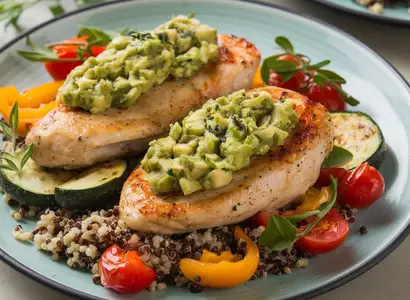
Day 6
Breakfast (12:00 PM – Eating Window Opens)
- Greek Yogurt Parfait with Nuts and Honey: Greek yogurt topped with nuts and a drizzle of honey. (1 cup Greek yogurt, 1 tbsp mixed nuts, 1 tsp honey)
Snack (4:00 PM)
- Boiled Egg: A simple and protein-rich snack. (1 boiled egg)
Dinner (8:00 PM – Eating Window Closes)
- Mediterranean Chicken Breasts with Avocado Tapenade: Grilled chicken breasts served with a flavorful avocado tapenade. (6 oz chicken breasts, ¼ cup avocado tapenade)
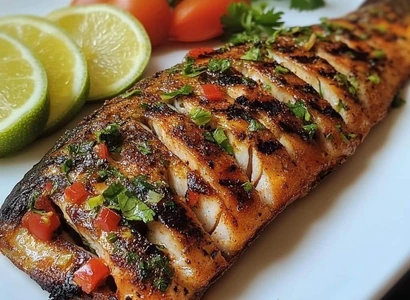
Day 7
Breakfast (12:00 PM – Eating Window Opens)
- Egg and Veggie Scramble: Scrambled eggs with bell peppers, onions, and spinach. (2 eggs, ½ cup bell peppers, 1 cup spinach)
Snack (4:00 PM)
- Vegetable Sticks: Fresh vegetable sticks like carrots and celery with a low-calorie dip. (1 cup vegetable sticks)
Dinner (8:00 PM – Eating Window Closes)
- Grilled Trout with Steamed Vegetables: Flavorful grilled trout served with a side of lightly steamed vegetables. (6 oz trout, 1 cup steamed vegetables)
16/8 Intermittent Fasting Rules
Here are some key rules for intermittent fasting, particularly for the 16:8 method, along with information about choosing different eating windows:
- Fasting Period: Fast for 16 hours each day. During this time, you should avoid all foods and calorie-containing beverages. Only water, herbal teas, and black coffee are typically allowed.
- Eating Window: You have an 8-hour eating window, which can be scheduled to fit your routine, for example, from 9:00 am to 5:00 pm, 10:00 am to 6:00 pm, or 12:00 pm to 8:00 pm.
- Meal Composition: Focus on nutrient-dense foods during your eating window. Include a mix of proteins, healthy fats, and carbohydrates to ensure balanced nutrition. Incorporate a variety of fruits, vegetables, lean meats, whole grains, and healthy fats.
- Portion Control: While there’s no strict calorie counting, aim to eat until you’re satisfied but not overly full. Listen to your body’s hunger and fullness cues.
- Hydration: Stay well-hydrated throughout the fasting period. Drink plenty of water, and consider herbal teas or black coffee if desired. Avoid sugary drinks and alcohol.
- Consistency: Stick to your chosen eating window consistently each day to help your body adjust and maximize the benefits of intermittent fasting.
- Avoid Overeating: Don’t use the eating window as an excuse to overeat or consume unhealthy foods. Focus on whole, nutrient-rich foods to support overall health and well-being.
- Physical Activity: Incorporate regular physical activity into your routine. Exercise can be done at any time, but many people find it helpful to work out during or just before their eating window.
- Listen to Your Body: Pay attention to how your body responds to fasting. If you experience any adverse effects, consult with a healthcare provider to ensure intermittent fasting is suitable for you.
Benefits of Intermittent Fasting
Intermittent fasting offers a wide range of benefits for both your body and mind. Here are some of the key benefits you can expect from practicing intermittent fasting:
- Weight Loss: Intermittent fasting can help you shed excess pounds by reducing calorie intake and increasing fat burning. It is an effective tool for long-term weight management.
- Improved Insulin Sensitivity: Intermittent fasting can enhance insulin sensitivity, which is crucial for maintaining stable blood sugar levels and preventing type 2 diabetes.
- Reduced Inflammation: Intermittent fasting has been shown to lower levels of inflammation in the body, which is linked to various chronic diseases, including heart disease and cancer.
- Improved Cholesterol Levels: Some studies indicate that intermittent fasting can help lower LDL cholesterol and triglyceride levels.
- Brain Function: Fasting can support brain health by promoting the production of brain-derived neurotrophic factor (BDNF), which is associated with improved cognitive function and protection against neurodegenerative diseases.
- Increased Growth Hormone: Fasting can boost levels of growth hormone, which may improve muscle growth and fat loss.
- Autophagy: Intermittent fasting can trigger a cellular process called autophagy, where damaged cells are cleared out and recycled, promoting cellular repair and longevity.
- Reduced Oxidative Stress: Intermittent fasting may reduce oxidative stress and inflammation, both of which are linked to aging and age-related diseases.
- Lower Blood Sugar Levels: Reduced eating frequency can lead to more stable blood sugar levels.
Resources
- John Berardi’s report offers practical insights into intermittent fasting and its implications.
- Evidence from decades of animal and human research points to wide-ranging health benefits of intermittent fasting, including improvements in obesity, diabetes, cardiovascular disease, cancers, and neurological disorders.
- Intermittent fasting induces cellular repair processes through autophagy, potentially protecting conditions such as cancer and Alzheimer’s disease.
Conclusion
In conclusion, this 7-day beginner intermittent fasting meal plan provides a diverse and nutritionally balanced approach to easing into the intermittent fasting routine.
By incorporating a variety of lean proteins, whole grains, healthy fats, and an abundance of fruits and vegetables, this meal plan aims to ensure that individuals receive the nourishment they need during their eating window.
The inclusion of nutrient-dense snacks also helps to curb hunger between meals.
It’s important for individuals embarking on an intermittent fasting journey to personalize their meal plan according to their dietary preferences and nutritional needs, and to consult with a healthcare professional before making significant changes to their eating patterns.
This beginner intermittent fasting meal plan, with its time-specific meal suggestions, is designed to fit within a 12:00 PM to 8:00 PM eating window, allowing for a 16-hour fasting period from 8:00 PM to 12:00 PM the following day.
- Delicious and mouthwatering Daniel Fast recipes
- 2-week no sugar diet plan
- 7-day oatmeal diet for weight loss
- Foods to lower triglycerides
- Clean eating meal plan for beginners
- The ketogenic diet for beginners
- How to reverse prediabetes within 3 months
- Carb cycling meal plan
- 7-day Daniel Fast meal plan
- Can dogs eat bananas?
- Can dogs eat shrimp?
- 100 delicious low FODMAP snack ideas
- 21-day fatty liver diet plan
- 30 day carnivore diet meal plan
- 7 day meal plan for gestational diabetes
- Alpine ice hack theory for weight loss
- Nurse Anesthetist salary
- Caregiver vs caretaker
FAQs
Can we eat dinner in intermittent fasting?
Yes, you can eat dinner while practicing intermittent fasting. If you follow a 16:8 fasting schedule, for example, you would eat your last meal (dinner) before the fasting period begins, within the 8-hour eating window.
Is it better to fast for 12 or 16 hours?
A 12-hour fast (12:12) is generally considered a beginner-friendly approach, while a 16-hour fast (16:8) is more advanced and often associated with more significant health benefits, such as improved metabolism and weight loss.
Why am I not losing weight on 16:8 fasting?
Not losing weight on a 16:8 fasting plan may be due to several factors: consuming more calories than needed during the eating window, choosing high calorie or low nutrition foods, lack of physical activity, or underlying metabolic issues.
What can I drink while fasting?
While fasting, you can drink water, herbal teas, and black coffee. These beverages are typically calorie free and won’t break your fast.
How many kg can I lose with 16:8 intermittent fasting?
The amount of weight loss with 16:8 intermittent fasting varies by individual. On average, people may lose between 0.5 to 1 kg (1 to 2 lbs) per week, depending on factors like diet, activity level, and metabolic rate.
Is Coke Zero allowed while fasting?
Coke Zero is generally considered acceptable during fasting as it contains no calories and does not directly break the fast.
However, it is best consumed in moderation, as some artificial sweeteners may impact insulin sensitivity or appetite in sensitive individuals.
Can I eat boiled eggs during fasting?
No, eating boiled eggs is not allowed during fasting periods as it breaks the fast. Boiled eggs should be consumed during the eating window.
Does intermittent fasting work without exercise?
Yes, intermittent fasting can be effective for weight loss and health improvements without exercise. However, exercise can complement fasting by boosting metabolism and supporting overall fitness goals.
